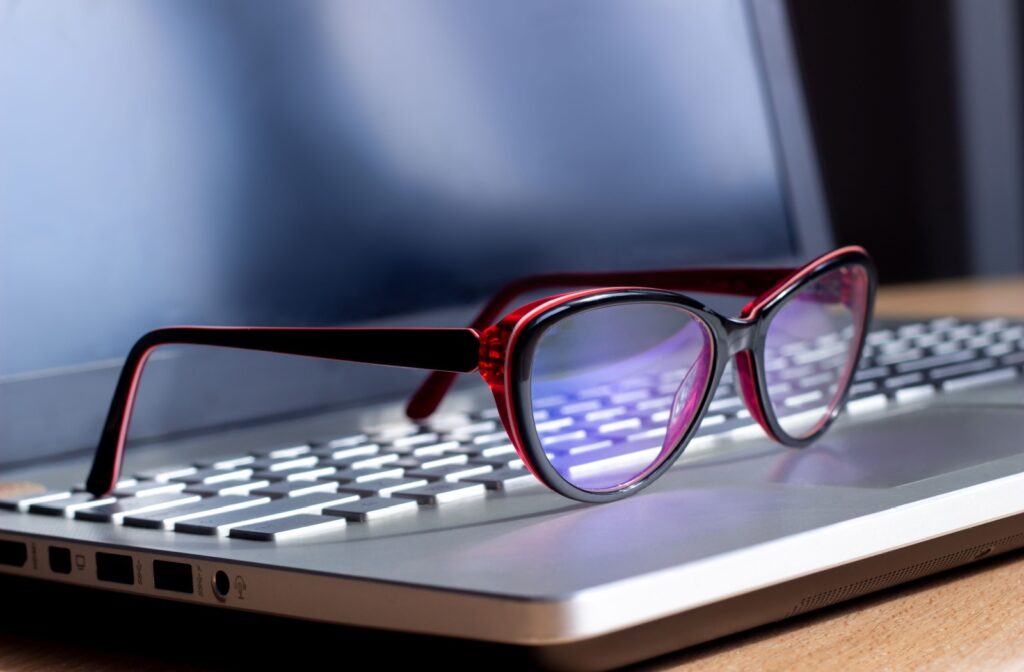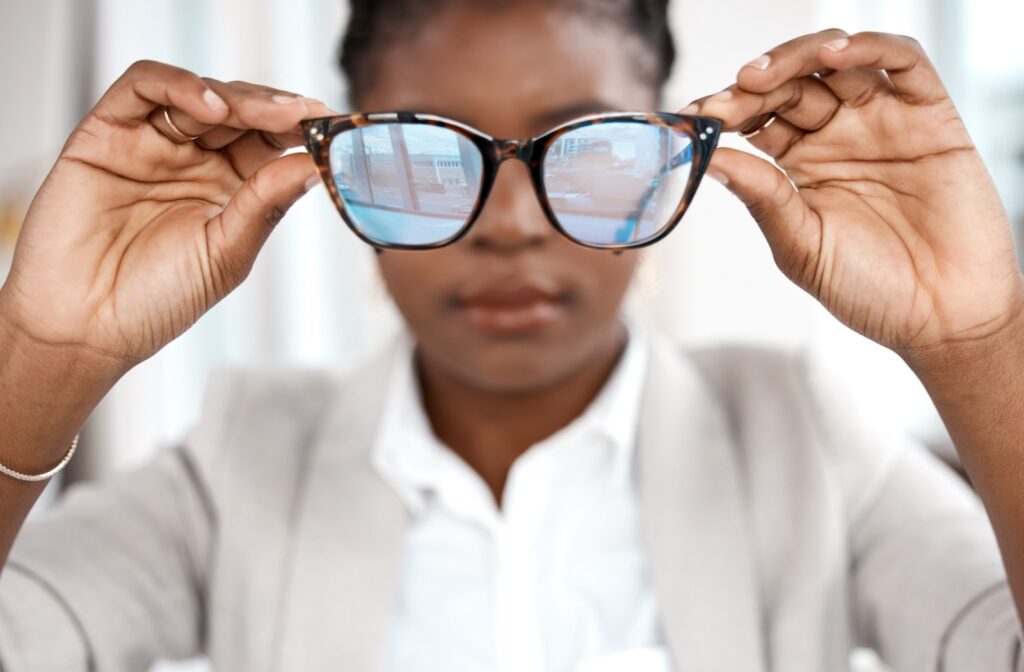In today’s digital world, screen time is at an all-time high. This, in turn, has led to concerns about how prolonged exposure to blue light affects eye health. Blue light glasses are specially designed eyewear that helps reduce exposure to blue light, which is emitted by digital screens, LED lighting, and the sun.
To learn more about digital eye strain and other ways to protect your vision, check out Total Vision’s guide to eye exams and explore lens options tailored for your needs.
Understanding Blue Light: What Is It?
Blue light is high-energy, short-wavelength light in the visible light spectrum. While some blue light is naturally present in sunlight and contributes to regulating our sleep-wake cycle, excessive artificial exposure can strain your eyes and potentially disrupt your health.
Devices like smartphones, tablets, and computers are significant sources of artificial blue light, which has raised concerns about its long-term effects on vision and overall well-being.
How Do Blue Light Glasses Work?
Blue light glasses have gained popularity as a solution to reduce eye strain from prolonged screen use, but the evidence behind their effectiveness is limited. Blue light is a high-energy, short-wavelength light emitted by digital screens, LED lighting, and the sun.
While blue light can disrupt sleep when exposure occurs at night, most optometrists agree that it’s not a major cause of digital eye strain.
Instead, symptoms like headaches, blurred vision, and dry eyes are more likely caused by extended screen time and reduced blinking, rather than blue light exposure.
What Blue Light Glasses Claim to Do
Blue light glasses are marketed to:
- Reduce eye strain from screens.
- Prevent blue light from disrupting sleep cycles.
- Protect against potential long-term eye damage.
However, according to research, there is no strong evidence to suggest that blue light directly harms the eyes or causes digital eye strain. Studies indicate that complaints like fatigue and discomfort are more related to focusing issues and prolonged near work, not blue light itself.

Additional Tips to Reduce Blue Light Exposure
While blue light glasses may be helpful to some, incorporating these habits can further protect your eyes:
- Follow the 20-20-20 Rule: Every 20 minutes, look at something 20 feet away for 20 seconds to reduce eye strain.
- Adjust Your Device Settings: Use night mode or blue light filters on your devices to lower blue light emission.
- Blink Often: Consciously blinking more can combat dry eyes caused by prolonged screen use.
- Create a Screen-Free Zone Before Bed: Reduce screen time at least one hour before sleeping to support your natural sleep-wake cycle.
Can You Use Blue Light Glasses Outdoors?
Yes, while blue light glasses are primarily used for indoor screen exposure, they can also help filter blue light from sunlight. However, they’re not a substitute for sunglasses, as they don’t offer the UV protection necessary for outdoor use. For outdoor activities, consider UV-blocking sunglasses with blue light protection.
How to Choose the Right Pair of Blue Light Glasses
If you decide to shop for blue light glasses, keep these factors in mind:
- Quality Coatings: Make sure the glasses have high-quality blue light-blocking coatings.
- Prescription Options: If you wear corrective lenses, consider combining blue light filters with your prescription.
- Comfort and Fit: Look for lightweight frames that you can wear comfortably throughout the day.
- Style Preferences: Many blue light glasses come in a variety of frame styles to suit your personal taste.
For tailored recommendations, schedule a visit with us, where we can help you choose the best option for your needs and lifestyle.
Are there Benefits of Blue Light Glasses?
- Placebo Effect: Some users report feeling less eye strain, but this could be due to behavioral changes, such as taking more breaks, rather than the glasses themselves.
- Reduced Glare: Blue light glasses may help cut down on glare from screens, which can improve comfort in brightly lit environments.
- Sleep Improvement: If worn in the evening, blue light glasses are said to help reduce exposure to blue light, which disrupts melatonin production and affects sleep cycles. However, there are still studies being done on this.
Myths About Blue Light Glasses
Like any trending product, blue light glasses have sparked misconceptions. Let’s clear a few up:
- Myth: Blue light glasses completely eliminate all blue light.
Fact: They reduce, but don’t eliminate, blue light exposure. - Myth: Blue light glasses are only for those with vision problems.
Fact: Anyone using digital screens can benefit, regardless of whether they wear prescription glasses. - Myth: All blue light glasses are the same.
Fact: Quality varies, so it’s important to choose glasses with effective coatings and trusted brands.
Are Blue Light Glasses Worth the Investment?
When deciding whether to invest in blue light glasses, it’s important to weigh the claims against the scientific evidence. Blue light glasses are marketed as a solution for reducing digital eye strain, improving sleep, and protecting long-term eye health. However, most optometrists and eye health experts agree that the benefits of blue light glasses are often overstated.
Seeing the Future Clearly
Blue light glasses are an accessible and practical tool to protect your eyes from the strain and discomfort of excessive blue light exposure. By combining them with healthy screen habits and regular eye exams, you can prioritize your vision and overall well-being in a screen-dominated world.
If you’re curious about how blue light glasses could benefit you or want personalized advice, schedule an appointment with your trusted neighborhood eye care provider, Total Vision, today. Visit us at Riverside Optometry!



